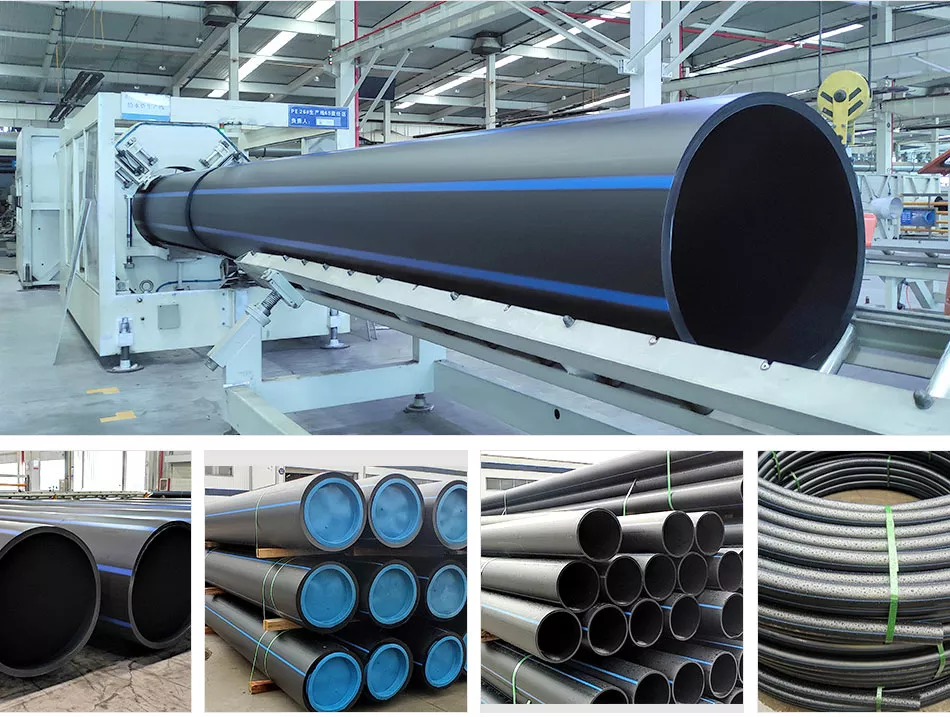Pipe Manufacturing Midland TX: Process Explained
Recognizing the Secret Advantages of HDPE Pipe for Water and Wastewater Monitoring
Using HDPE pipe in water and wastewater monitoring provides numerous benefits that merit consideration. Its outstanding toughness and long life-span make it a favored choice for many tasks. Additionally, the product's resistance to rust and chemical damages improves its integrity in different settings. The advantages prolong past just long life and resistance. Midland TX HDPE Pipe Fittings in Stock. Discovering its cost-effectiveness and ecological effect reveals a lot more compelling factors for its prevalent adoption in contemporary framework
Extraordinary Toughness and Longevity

HDPE pipeline attracts attention for its exceptional toughness and durability, making it a recommended selection in water monitoring systems. Created from high-density polyethylene, these pipelines can hold up against substantial pressure and tension, making certain reliable performance over time. Their robust nature allows them to endure severe ecological problems, consisting of temperature level changes and dirt activities, which can create various other materials to fail.
The life-span of HDPE pipelines typically exceeds half a century, supplying a cost-efficient service for towns and sectors alike. Additionally, the material's lightweight buildings streamline installation, decreasing labor prices and durations. This longevity lessens the requirement for constant repair services or replacements, further improving its economic allure.
In water administration applications, the reliability of HDPE pipelines implies fewer disturbances and enhanced solution continuity, making them integral to lasting infrastructure growth. The mix of toughness and durability solidifies HDPE's role as a keystone in efficient water management options.

Resistance to Rust and Chemical Damage
While lots of products succumb to rust and chemical damages over time, HDPE pipes show remarkable resistance, making them perfect for different water monitoring applications. This resilience stems from the molecular structure of high-density polyethylene, which is naturally non-reactive and does not rust like steels or deteriorate from exposure to extreme chemicals. Consequently, HDPE is highly efficient in settings with aggressive substances, such as wastewater systems that may include acids, bases, and organic solvents.
Furthermore, HDPE pipelines can withstand ecological factors such as soil acidity and saline conditions, even more improving their suitability for diverse applications (custom hdpe pipe manufacturing Midland TX). Their ability to maintain structural integrity over time reduces the risk of leakages and failings, which is essential in guaranteeing the security and dependability of water circulation and wastewater administration systems. As a result, the resistance to rust and chemical damages significantly contributes to the overall effectiveness and longevity of HDPE piping options
Cost-Effectiveness and Financial Advantages
When thinking about the financial implications of water management systems, the cost-effectiveness of HDPE pipes comes to be apparent. These pipelines supply reduced installation and maintenance costs contrasted to standard products like metal or concrete. Their light-weight nature simplifies transport and installation, leading to reduced labor costs. In addition, HDPE pipes show a long life-span, often surpassing half a century, which equates to less replacements and long-lasting savings.
The resistance of HDPE to rust and chemical damages reduces the demand for pricey repair work and substitutes. The pipelines additionally support efficient water flow, lowering energy expenses connected with pumping systems. By minimizing leaks and water loss, HDPE pipes contribute to considerable economic advantages for districts and industries alike. In general, the first financial investment in HDPE piping can produce significant monetary returns over the life expectancy of the water monitoring system, making it a prudent choice for sustainable facilities growth.
Ecological Sustainability and Minimized Influence

Convenience and Adaptability in Installation
Since of their special residential or commercial properties, HDPE pipelines supply impressive flexibility and adaptability in installment, making them appropriate for a vast array of applications. Their light-weight nature enables for simpler handling and transport, minimizing labor expenses and installation time. HDPE pipes can be curved and formed to fit various terrains and task requirements, which is especially useful in challenging atmospheres.
In addition, their resistance to rust and chemical damages allows for installation in diverse setups without the demand for specialized safety coverings. The capability to fuse joints develops a continual, leak-free system, boosting the general honesty and reliability of the installment. HDPE's adaptability likewise accommodates ground activity, decreasing the risk of damage in locations prone to shifting soil. Generally, these characteristics make HDPE pipelines not just versatile yet likewise a preferred selection for water and wastewater management systems.
Often Asked Inquiries
Just How Does HDPE Pipeline Compare to PVC in Water Monitoring Applications?
HDPE pipe supplies superior versatility, resistance to deterioration, and durability contrasted to PVC. Its lighter weight promotes simpler installment, while its long lifespan minimizes substitute expenses, making HDPE a favored option in water administration applications.
What Is the Life Expectancy of HDPE Pipes Under Normal Problems?
Under typical problems, HDPE pipes can have a life-span ranging from 50 to 100 years. Their longevity and resistance to rust add to their long-lasting performance in numerous applications, making them a reliable selection for infrastructure.
Are HDPE Water Lines Recyclable After Their Life Span?
Yes, HDPE pipelines are recyclable after their life span. hdpe pipe suppliers Midland TX. They can be processed and repurposed right into new products, considerably decreasing environmental effect and advertising sustainability within the sector, making them an eco-friendly choice for piping options
What Is the Installation Process for HDPE Pipeline?
The installation procedure for HDPE pipes involves site preparation, trenching, pipe fusion or mechanical signing up with, backfilling, and stress screening. Correct techniques ensure a resilient and reliable system for carrying water and wastewater successfully.
Can HDPE Piping Be Utilized for Both Safe And Clean and Non-Potable Water Solutions?
Yes, HDPE pipelines can be made use of for both safe and clean and non-potable water systems. Their flexibility, durability, and resistance to rust make them appropriate for numerous applications, making sure safe and reliable transport of water in different contexts.